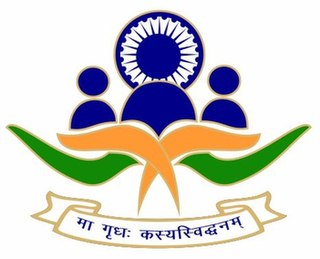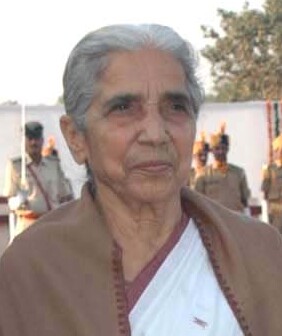Related Research Articles

Narendra Damodardas Modi is an Indian politician serving as the current prime minister of India since 26 May 2014. Modi was the chief minister of Gujarat from 2001 to 2014 and is the Member of Parliament (MP) for Varanasi. He is a member of the Bharatiya Janata Party (BJP) and of the Rashtriya Swayamsevak Sangh (RSS), a right-wing Hindu nationalist paramilitary volunteer organisation. He is the longest-serving prime minister outside the Indian National Congress.

Teesta Setalvad is an Indian civil rights activist and journalist. She is the secretary of Citizens for Justice and Peace (CJP), an organisation formed to advocate for the victims of 2002 Gujarat riots.

Kisan Baburao "Anna" Hazare is an Indian social activist who led movements to promote rural development, increase government transparency, and investigate and punish corruption in public life. In addition to organising and encouraging grassroots movements, Hazare frequently conducted hunger strikes to further his causes—a tactic reminiscent, to many, of the work of Mahatma Gandhi. Hazare also contributed to the development and structuring of Ralegan Siddhi, a village in Parner taluka of Ahmednagar district, Maharashtra, India. He was awarded the Padma Bhushan—the third-highest civilian award—by the Government of India in 1992 for his efforts in establishing this village as a model for others.

Navnirman Andolan was a socio-political movement in 1974 in Gujarat by students and middle-class people against economic crisis and corruption in public life. It is the only successful agitation in the history of post-independence India that resulted in the dissolution of an elected government of the state.
The Godhra train burning occurred on the morning of 27 February 2002, when 59 Hindu pilgrims and karsevaks returning from Ayodhya were killed in a fire inside the Sabarmati Express near the Godhra railway station in Gujarat, India. The cause of the fire remains disputed. The Gujarat riots, during which Muslims were the targets of widespread and severe violence, took place shortly afterward.

The 2002 Gujarat riots, also known as the 2002 Gujarat violence or the Gujarat pogrom, was a three-day period of inter-communal violence in the western Indian state of Gujarat. The burning of a train in Godhra on 27 February 2002, which caused the deaths of 58 Hindu pilgrims and karsevaks returning from Ayodhya, is cited as having instigated the violence. Following the initial riot incidents, there were further outbreaks of violence in Ahmedabad for three months; statewide, there were further outbreaks of violence against the minority Muslim population of Gujarat for the next year.

Ehsan Jafri was an Indian politician and former member of the 6th Lok Sabha for the Congress Party, who was killed in the Gulbarg Society massacre.

A Lokpal is an anti-corruption authority or body of ombudsman who represents the public interest in the Republic of India. The current Chairperson of Lokpal is Ajay Manikrao Khanwilkar. The Lokpal has jurisdiction over central government,anyone who is or has been Prime Minister, or a Minister in the Union government, or a Member of Parliament, as well as officials of the Union government under Groups A, B, C and D. Also covered are chairpersons, members, officers and directors of any board, corporation, society, trust or autonomous body either established by an Act of Parliament or wholly or partly funded by the Centre. It also covers any society or trust or body that receives foreign contributions above ₹10 lakh. to inquire into allegations of corruption against its public functionaries and for matters connected to corruption. The Lokpal and Lokayuktas Act was passed in 2013 with amendments in parliament, following the Jan Lokpal movement led by Anna Hazare in 2010. The Lokpal is responsible for enquiring into corruption charges at the national level while the Lokayukta performs the same function at the state level. The age of Lokpal on the date of assuming office as the chairperson or a member should not be less than 45 years.

Kamla Beniwal was an Indian independence activist and politician. She was a senior member of Indian National Congress party. She served as a minister in different posts and Deputy Chief Minister of Rajasthan in 2003. Later she served as Governor of different Indian states between 2009 and 2014. She became the first woman minister in Rajasthan in 1954 at the age of 27. She was the first ever woman Governor of any northeastern state. She was a recipient of Tamra Patra Award from former prime minister Indira Gandhi in recognition of her contribution in the freedom struggle.

The Gulbarg Society massacre took place on 28 February 2002, during the 2002 Gujarat riots, when a crowd started stone pelting the Gulbarg Society, a Muslim neighbourhood in the eastern part of Chamanpura, Ahmedabad in the Indian state of Gujarat. Most of the houses were burnt, and at least 35 victims, including a former Congress Member of Parliament, Ehsan Jafri, were burnt alive, while 31 others went missing after the incident, later presumed dead, bringing the total deaths to 69.
Sanjiv Bhatt is a former Indian Police Service officer of the Gujarat-cadre. He is known for his role in filing an affidavit in the Supreme Court of India against the then Chief Minister of Gujarat, Narendra Modi, concerning Modi's alleged role in the 2002 Gujarat riots. He claimed to have attended a meeting, during which Modi allegedly asked top police officials to let Hindus vent their anger against the Muslims. However, the Special Investigation Team appointed by the Supreme Court of India concluded that Bhatt did not attend any such meeting, and dismissed his allegations.

The Naroda Patiya massacre took place on 28 February 2002 at Naroda, in Ahmedabad, India, during the 2002 Gujarat riots. 97 Muslims were killed by a mob of approximately 5,000 people, organised by the Bajrang Dal, a wing of the Vishva Hindu Parishad, and allegedly supported by the Bharatiya Janata Party which was in power in the Gujarat State Government. The massacre at Naroda occurred during the bandh (strike) called by Vishwa Hindu Parishad a day after the Godhra train burning. The riot lasted over 10 hours, during which the mob plundered, stabbed, sexually assaulted, gang-raped and burnt people individually and in groups. After the conflict, a curfew was imposed in the state and Indian Army troops were called in to contain further violence.

Parshottambhai Odhavjibhai Solanki is a Bharatiya Janata Party politician. He is member of Gujarat Legislative Assembly since 1998 representing Bhavnagar Rural constituency. He has served as the Minister of Fisheries in the Government of Gujarat. He is alleged to have caused loss of ₹400 crore to the government of Gujarat by granting contracts improperly.

Kabir Kala Manch was a cultural organisation that was formed in Pune, Maharashtra, India, in the wake of the Gujarat riots in 2002. Through music, poetry and theatre, it aims to spread an anti-caste, pro-democracy message. It comprises students and young professionals who perform protest poetry and plays in slums and streets.
The Nanavati-Mehta Commission is the commission of inquiry appointed by the government of Gujarat to probe the Godhra train burning incident of 27 February 2002. Its mandate was later enlarged to include the investigation of the 2002 Gujarat riots. It was appointed on 6 March 2002, with K. G. Shah, a retired Gujarat High Court judge, as its only member. It was later re-constituted to include G. T. Nanavati, a retired judge of the Supreme Court of India, after protests from human rights organizations over Shah's closeness to then-Gujarat Chief Minister Narendra Modi. Akshay H. Mehta, retired judge of the Gujarat High Court, replaced Shah when the latter died before the submission of the commission's interim report. Mehta was the same judge who had granted bail to Babu Bajrangi, the main accused of the Naroda Patiya massacre.

Mukul Sinha was an Indian human rights activist and a lawyer at the Gujarat High Court in Ahemdabad. He was an active trade union leader and a trained physicist. He legally represented the families of the individuals who were killed in Gujarat following the 2002 riots and in Manipur, in which he secured convictions of the politicians and police officers involved. Along with his wife Nirjhari Sinha, he founded and served as the president of Jan Sangharsh Manch, an independent civil rights organization with the aim of addressing issues of labour and workers rights. He was also a vocal critic of erstwhile Gujarat Chief Minister Narendra Modi.

Jignesh Mevani is an Indian politician, lawyer, activist and former journalist serving as the representative of the Vadgam constituency in the Gujarat Legislative Assembly since 2017. He is a member of the Indian National Congress party. He is the convener of the Rashtriya Dalit Adhikar Manch (RDAM).
Gujarat Lokayukta is the Parliamentary Ombudsman for the state of Gujarat (India). It is a high level statutory functionary, created to address grievances of the public against ministers, legislators, administration and public servants in issues related to misuse of power, mal-administration and corruption. It was first formed under the Gujarat Lokayukta and Upa-Lokayukta Act, and approved by the president of India on 1986. The passage of Lokpal and Lokayukta's Act,2013 in Parliament had become law from 16 January 2014 and requires each state to appoint its Lokayukta within a year. A bench of Lokayukta should consist of judicial and non-judicial members. An Upa-Lokayukta is a deputy to Lokayukta and assists him in his work and acts in-charge Lokayukta in case the position fells vacant before time.

Vinai Kumar Saxena is an Indian former business executive and environmentalist, who is currently serving as the 22nd Lieutenant Governor of Delhi since 2022. He previously served as chairman of the Khadi and Village Industries Commission (KVIC).

The chief ministership of Narendra Modi began 7 October 2001 with his oath as the chief minister of Gujarat at the Raj Bhavan, Gandhinagar. He became the 14th chief minister of Gujarat, succeeding Keshubhai Patel of the Bharatiya Janata Party.
References
- 1 2 3 "Anna man is Gujarat Lokayukta". The Times of India . 27 August 2011. Archived from the original on 9 September 2011. Retrieved 19 April 2012.
- ↑ Averting the Apocalypse: social movements in India today, by Arthur Bonner, 1990, p. 126-133.
- ↑ "Massacre Of Dalits, Christians In Gujarat Recalled". SAR News. 16 February 2011. Retrieved 19 April 2012.
- ↑ "Appointment of Lokayukta upheld; setback to Modi". The Hindu. 18 January 2012. Retrieved 19 April 2012.
- ↑ "Appointment of Lokayukta upheld; setback to Modi". The Hindu. 2 January 2013. Retrieved 3 January 2013.
- ↑ "Modi govt's new bill trying to dilute power of Gujarat Lokayukta?". 3 April 2013.
- ↑ "Reject new Lokayukta Bill, Cong tells Governor". 10 April 2013.